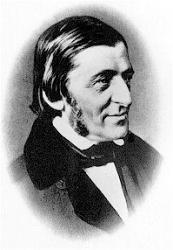Author: Ralph Waldo Emerson

Emerson, Ralph Waldo, son of an Unitarian Minister, was born at Boston, U.S., May 25, 1803. He was educated for the Unitarian Ministry, and acted, 1829-32, as one of their ministers. Ultimately he left the ministry, and devoted himself to lecturing and literature. As a philosopher, essayist, and poet he rose to a distinguished position. He died at Concord, Massachusetts, April 27, 1882. His published works include Poems, 1846; Orations, Lectures, and Addresses, 1844; Representative Men, 1850; English Traits, 1856, &c. His hymns are not numerous.
They include:—
1. Out from the heart of nature rolled. The Everlasting Word. This is part of his poem The Problem, published in the Dial, July, 1840; and then in the 1st ed. of his Po…
Go to person page >Author: Eliza T. Clapp
Clapp, Eliza Thayer, a resident at Dorchester, Massachusetts, U.S., and author of Words in the Sunday School; and Studies in Religion, 1845, contributed at the request of Ralph W. Emerson three hymns and two poems to The Dial, 1841. From one of the hymns, in 9 stanzas of 4 lines, published in The Dial, July, 1841, and entitled "The future is better than the past," the hymn "All before us lies the way" (Onward with Confidence) is taken. It was given in Hedge & Huntington's Unitarian Hymns for the Church of Christ, 1853, and has been repeated in several collections. It is usually attributed to Emerson, but in error. (George Cooke, in Journal of Speculative Philosophy, 1885.) [Rev. Valentine D. Davis, B.A.]
--John Julian, Dictionar…
Go to person page >